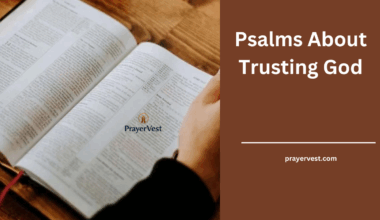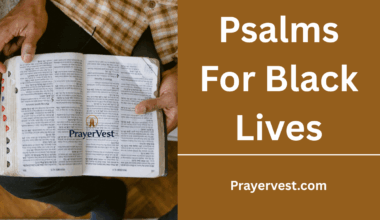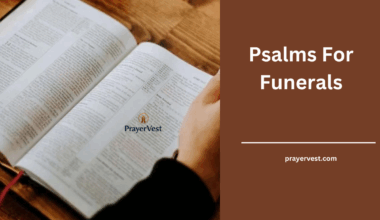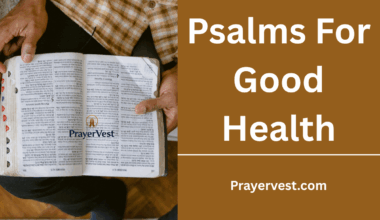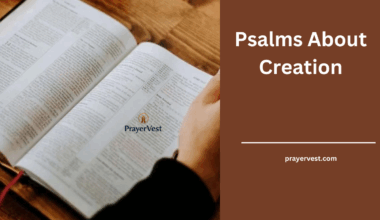One of the most intense and agonizing human feelings is loneliness. Loneliness has a way of making the soul feel empty, invisible, and unheard, regardless of the cause—physical separation, emotional detachment, the death of a loved one, or even a spiritual drought. There are times when you feel like no one can truly get how deeply you are hurting.
However, we find words that name the very emotions we find difficult to articulate and voices that echo our wordless cries within the pages of Scripture, especially the Book of Psalms. Instead of avoiding hardship, the Psalms for loneliness bring us nearer to God, who assures us that he will never abandon us.
The Psalms’ unvarnished honesty and heavenly consolation are what make them so beautiful. The Psalms are prayers that were born in the wilderness of loneliness and were written by men like David, who frequently found himself abandoned, betrayed, or hiding in caves.
They show us that bringing our loneliness to God is not only acceptable, but that He even embraces this vulnerability. A lot of the Psalms start out with intense grief and sadness but conclude with pleasure, hope, and a fresh faith in God’s presence. This journey from loneliness to intimacy serves as a reminder that God meets us in our loneliness rather than condemning it.
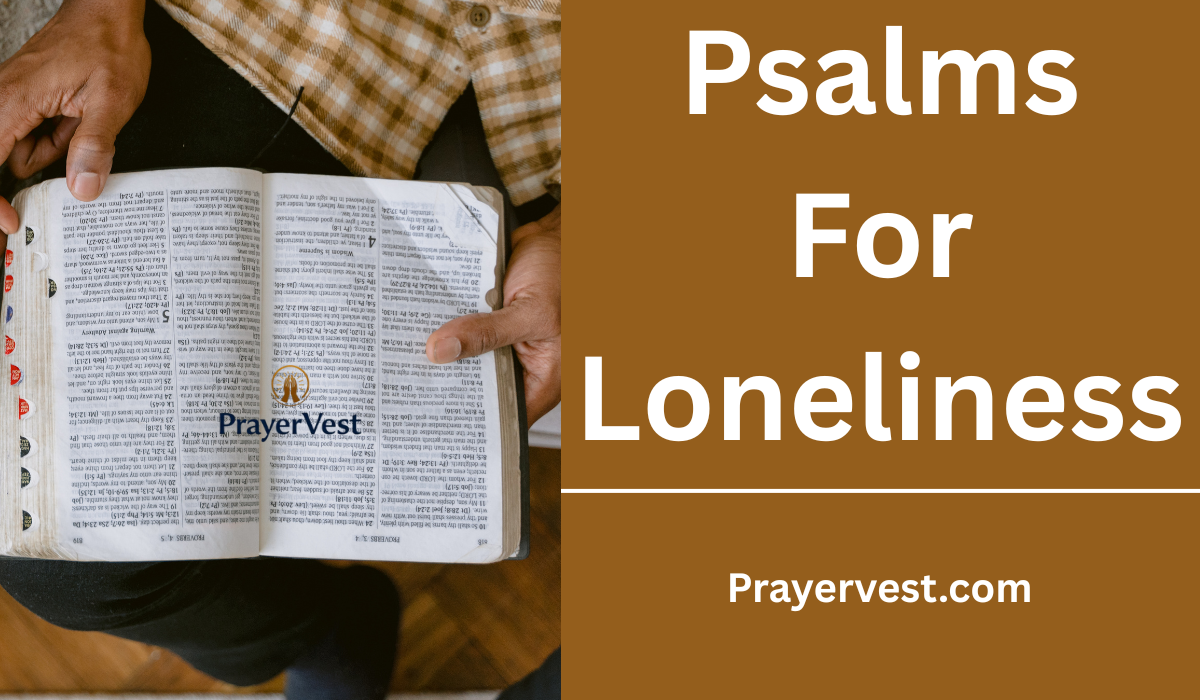

These Psalms are for you if you are experiencing loneliness right now. They are holy music for quiet weeping and divine words for empty souls. Allow these verses to help you, whether you need to cry, ask questions, confess, or just be reminded that you are not alone. May they cheer you up, give you hope, and softly remind you that you are incredibly loved, always seen, and never really alone—God is with you, even in this moment.
50 Most Effective Psalms For Loneliness (2026)
1. Psalm 25:16
“Turn to me and be gracious to me, for I am lonely and afflicted.”
In this heartfelt cry, David expresses the depth of his isolation and distress. Rather than hiding his emotions, he brings them directly to God, seeking divine attention and mercy. This verse affirms that loneliness is not something to be buried or masked, but something we can fully surrender to the One who understands us completely. God’s grace does not recoil from our vulnerability—instead, He draws near to the brokenhearted.
Reflection
Loneliness often tempts us to believe we are forgotten or unseen, but Psalm 25:16 dismantles that lie. David’s prayer teaches us that we can cry out in our solitude, and God will hear. Our loneliness becomes a sacred invitation to deeper intimacy with the Father. Even when human companionship fails, divine presence remains. In God, we find a companion who never turns away, never tires, and never leaves. The cry for grace in our loneliness becomes the bridge to healing love and unshakable belonging.
2. Psalm 142:4
“Look and see, there is no one at my right hand; no one is concerned for me. I have no refuge; no one cares for my life.”
David, hiding in a cave and hunted by Saul, voices the despair of being utterly alone. His words portray the agony of feeling uncared for, with no visible support or safety. Yet this lament is directed toward God—a sign that even in the darkest loneliness, our deepest truths can be brought before Him. This Psalm validates the pain of abandonment while redirecting the soul toward divine refuge.
Reflection
Sometimes our lowest points are when we feel most unseen by the world, but it’s in those moments that God sees us most clearly. David’s raw honesty models how we can approach God without pretense. We don’t need to filter our despair; we need to express it faithfully. When the world forgets us, God remembers. When no one cares, God draws near. Loneliness may empty our hands, but it opens our hearts to grasp the fullness of God’s companionship.
3. Psalm 102:7
“I lie awake; I have become like a bird alone on a roof.”
This verse captures the aching stillness of solitude—a sleepless heart, restless in isolation. The imagery of a solitary bird high above the city evokes detachment, vulnerability, and longing for connection. The psalmist is not merely describing sleeplessness but the emotional weight of being alone, suspended between earth and heaven, unnoticed by those below.
Reflection
Loneliness can feel like watching life move on without you, distant and disconnected. Yet even here, in the night watches, God listens. The image of the lonely bird isn’t just about sorrow—it is about being seen by the One who watches over the city. Your silent nights are sacred. Your unseen pain is recorded in God’s heart. And in those moments where words fail, the God of comfort speaks tenderly in stillness, reminding you that even aloneness can be holy ground.
4. Psalm 88:18
“You have taken from me friend and neighbor—darkness is my closest friend.”
This haunting conclusion to Psalm 88 is one of the few places in Scripture where the psalm ends in unresolved despair. The psalmist feels abandoned by all and submerged in emotional and spiritual darkness. Yet even in such bleakness, the psalm remains a prayer—a cry still directed toward God, which itself is a profound act of faith.
Reflection
There are seasons where even faith feels like a whisper into a void. Psalm 88 permits us to name that reality. It teaches us that God does not require us to clean up our emotions before coming to Him. The honesty of “darkness is my closest friend” becomes a sacred offering when lifted to God. In the place where all others seem absent, God remains—listening, present, and able to carry the weight of your deepest grief without turning away.
5. Psalm 38:11
“My friends and companions avoid me because of my wounds; my neighbors stay far away.”
Here, the psalmist reveals the pain of isolation not just from strangers, but from those once-trusted friends and companions who now keep their distance. This verse shows the sting of rejection and the added loneliness that comes when suffering is met not with support but abandonment.
Reflection
Few wounds cut deeper than being left alone in pain. When those closest to us retreat, we are tempted to believe we are unworthy of love or presence. But Psalm 38 reminds us that even when human relationships break down, God’s nearness endures. Your worth is not determined by others’ capacity to stay—it is grounded in the unwavering commitment of a God who enters into your wounds and never walks away.
6. Psalm 13:1
“How long, Lord? Will you forget me forever? How long will you hide your face from me?”
This question, repeated twice for emphasis, reveals the agony of feeling forgotten even by God. The psalmist isn’t making a theological claim—he is expressing emotional reality. The cry of “How long?” echoes the longing of every lonely heart that feels the absence of comfort and the delay of relief.
Reflection
God invites us to ask hard questions. Psalm 13 proves that faith is not the absence of doubt but the insistence on engaging God even through our pain. When you feel like heaven is silent and your prayers bounce off the ceiling, this verse reminds you that even unanswered prayers are still prayers. In voicing your ache, you draw near to the God who never actually leaves, even when His presence feels hidden. Hold on—the silence is not the end of the story.
7. Psalm 41:9
“Even my close friend, someone I trusted, one who shared my bread, has turned against me.”
This verse speaks to the deep wound of betrayal by someone close. The pain of loneliness is compounded when it follows broken trust or unexpected rejection. The psalmist shares the ache of being forsaken not by strangers, but by someone intimately known—a companion, now turned adversary.
Reflection
Loneliness that stems from betrayal carries a unique kind of sorrow. It shatters the safety of relationships and can leave lasting scars. Yet even in this pain, God sees. He understands betrayal—Jesus Himself experienced it. Psalm 41:9 invites us to bring our broken trust before the One who is always faithful. While people may abandon us, God remains a Friend who never turns away, and in His love, we can find healing from even the deepest relational wounds.
8. Psalm 68:6
“God sets the lonely in families, he leads out the prisoners with singing; but the rebellious live in a sun-scorched land.”
This verse presents a promise of divine intervention in loneliness. God doesn’t just comfort the lonely—He places them into relationships, restoring them into community and purpose. The verse underscores God’s desire to rescue and reconnect, contrasting His care with the isolation that rebellion often brings.
Reflection
God’s heart leans toward the lonely. He is not content to leave you in isolation; He has a plan to surround you with love, belonging, and connection. While human families may falter, God crafts spiritual families through His Church, His Spirit, and His divine providence. Trust that your loneliness is not your final chapter. God sees your ache, and in His time, He will bring people, healing, and joy into the spaces that feel most empty.
9. Psalm 27:10
“Though my father and mother forsake me, the Lord will receive me.”
This verse goes to the core of relational abandonment—even if the most foundational relationships in life fail, God steps in as the ultimate caregiver and protector. The psalmist declares that God’s acceptance is more secure than even the bonds of family.
Reflection
There is perhaps no deeper wound than being forsaken by those who were meant to protect and love us unconditionally. Psalm 27:10 is a sacred balm for such wounds, assuring us that God’s reception of us is unwavering. His love is not based on merit or circumstance—it is rooted in His eternal nature. When earthly relationships collapse, you can rest in the arms of a Heavenly Father who will never let go.
10. Psalm 62:5
“Yes, my soul, find rest in God; my hope comes from him.”
This gentle command to the soul reveals a personal decision to shift focus away from external circumstances and toward the inner assurance found in God alone. In seasons of loneliness, this verse invites us to cultivate rest not from surroundings, but from within, by anchoring in hope.
Reflection
Loneliness often unsettles our inner world, but Psalm 62:5 teaches us to speak peace over our souls. In the absence of others, God becomes not just our source of comfort, but our rest, our rhythm, and our reassurance. Let your hope be rewired not by temporary circumstances, but by the eternal promises of a faithful God. As you wait, trust that He is enough, and in Him, you will never be truly alone.
11. Psalm 73:23-24
“Yet I am always with you; you hold me by my right hand. You guide me with your counsel, and afterward you will take me into glory.”
Despite moments of confusion and bitterness expressed earlier in the psalm, the writer comes to a stunning realization: God has never left. Even in loneliness, God’s presence is constant, His hand steady, and His guidance faithful. This is a powerful reminder that God walks intimately with us through every valley.
Reflection
Loneliness can blind us to the nearness of God, but His hand never lets go. Psalm 73:23-24 invites us to reflect not on who has left us, but on who has remained. God’s companionship is not distant or vague—it is personal and active. He holds us, leads us, and promises an eternal future with Him. In every moment of isolation, you can lean into the assurance that you are already in His embrace, being led step-by-step into peace.
12. Psalm 34:18
“The Lord is close to the brokenhearted and saves those who are crushed in spirit.”
This verse is a cornerstone of comfort for the lonely and broken. God does not merely observe from afar—He draws near. His saving presence is specifically promised to those who feel emotionally shattered and spiritually heavy.
Reflection
In the moments where you feel like your heart can’t take any more, know that you are in sacred company. Psalm 34:18 reveals a tender truth: your brokenness beckons God’s closeness. You don’t have to fix yourself to attract His love—your crushed spirit is the very place where He meets you. Let that nearness be your anchor. He saves not from a distance, but right there in the rubble of your sorrow.
13. Psalm 119:114
“You are my refuge and my shield; I have put my hope in your word.”
This verse reveals a decision to find safety and strength in God’s promises, even when external protection or companionship may be absent. God’s Word becomes the shelter, and His presence the armor for the lonely soul.
Reflection
When loneliness surrounds you like a storm, God’s Word becomes your fortress. It doesn’t merely inspire—it shelters. Psalm 119:114 reminds us that we can choose where to place our hope. When human voices grow quiet, let God’s voice grow louder. Run to His Word as your refuge, let it shield your heart, and trust that every promise is for you, even in your most deserted hour.
14. Psalm 147:3
“He heals the brokenhearted and binds up their wounds.”
God is not indifferent to emotional pain—He is a healer. This verse highlights His compassionate action toward those whose hearts have been broken by loneliness, loss, or rejection. Healing isn’t rushed or impersonal; it’s deliberate and intimate.
Reflection
Loneliness breaks things inside us that only God can truly mend. Psalm 147:3 reassures us that He is not just a listener, but a healer. He binds wounds with gentle hands and infinite patience. Your broken heart is not too much for Him. Let Him in. Trust that every wound you surrender becomes a place where His love can do its quiet, beautiful work.
15. Psalm 16:8
“I keep my eyes always on the Lord. With him at my right hand, I will not be shaken.”
This verse emphasizes the stabilizing power of God’s presence. In a world full of shifting relationships and uncertain emotions, the psalmist finds security by focusing on the unchanging nearness of God.
Reflection
When loneliness tempts you to feel unstable or forgotten, Psalm 16:8 offers a new focal point: the Lord. Fix your gaze not on what is missing, but on the One who stands beside you. With God at your right hand, your foundation cannot be shaken. His presence is your steadiness. Even when others drift away, He remains constant, holding you firm through every emotional storm.
16. Psalm 139:7-10
“Where can I go from your Spirit? Where can I flee from your presence? If I go up to the heavens, you are there; if I make my bed in the depths, you are there… even there your hand will guide me, your right hand will hold me fast.”
This passage beautifully expresses the inescapable presence of God. Whether in high moments or deep despair, God is not only aware but intimately present. There is no place so isolated or dark that His presence cannot reach.
Reflection
Loneliness often whispers that we are alone in the world, but Psalm 139 reminds us that God is everywhere we are, especially in the shadows. His Spirit surrounds us in the silence, in the late-night tears, in the places where no one else can go. You are not abandoned. Even when you feel hidden from the world, you are fully seen and fully held by a God who cannot be separated from your story.
17. Psalm 4:8
“In peace I will lie down and sleep, for you alone, Lord, make me dwell in safety.”
This verse reflects a soul that finds peace and rest not in the presence of people but in the presence of God. Despite surrounding circumstances, the psalmist experiences serenity because of God’s protective care.
Reflection
Loneliness often hits hardest at night, when silence amplifies sorrow. But Psalm 4:8 speaks of divine peace that transcends physical company. In God’s presence, we are safe—even in solitude. His peace wraps around us like a blanket, guarding our hearts and calming our thoughts. Rest tonight knowing that you are watched over by the One who never sleeps, never leaves, and never forgets.
18. Psalm 31:7
“I will be glad and rejoice in your love, for you saw my affliction and knew the anguish of my soul.”
This verse acknowledges God’s attentive care amid personal agony. The psalmist is comforted not just by the idea of God’s love, but by the fact that God sees and understands his pain.
Reflection
To be seen in your suffering is one of the greatest comforts in loneliness. Psalm 31:7 assures us that God is not distant or unaware—He knows every unspoken ache, every tear hidden behind a smile. His love is not passive; it rejoices in drawing near to us in pain. In your anguish, know this: you are not invisible. You are known, understood, and deeply loved.
19. Psalm 55:6
“I said, ‘Oh, that I had the wings of a dove! I would fly away and be at rest.’”
This poetic cry captures the desperate longing to escape loneliness and distress. The psalmist voices a desire many share in suffering—to flee to a place of rest and relief from the emotional burden.
Reflection
Loneliness can make the world feel heavy, and escape can feel like the only option. But even in these feelings of wanting to fly away, God invites us to find rest not in leaving, but in leaning on Him. Let His arms become your wings—lifting you into peace that transcends your situation. When you feel like running away, run to God instead. In Him, your restless heart can finally rest.
20. Psalm 143:4
“So my spirit grows faint within me; my heart within me is dismayed.”
This verse expresses spiritual exhaustion and emotional despair, a condition many experience in prolonged seasons of loneliness. The psalmist is honest about his inner depletion, yet his words are still directed toward God, indicating hope.
Reflection
There are days when your spirit feels crushed and your heart overwhelmed—and that’s okay. Psalm 143:4 gives voice to that pain, showing that even spiritual weariness can be brought before the Lord. In your fainting moments, God doesn’t expect you to be strong—He invites you to simply be honest. His presence does not require perfection; it only asks for surrender. And in that surrender, strength begins to return.
21. Psalm 6:6
“I am worn out from my groaning. All night long I flood my bed with weeping and drench my couch with tears.”
This verse vividly portrays the emotional and physical toll of sorrow. The psalmist doesn’t hide the extent of his pain—he openly expresses the deep, relentless grief that consumes his nights. It’s an image of raw, unfiltered loneliness.
Reflection
Loneliness can become a quiet suffering that builds over time, until it pours out in tears when no one is around. Psalm 6:6 affirms that even in those private moments of weeping, God is near. He sees every tear, hears every groan, and sits beside you in the silence. Your sorrow is not wasted—it’s seen, recorded, and gently held by a compassionate God who understands the language of tears.
22. Psalm 10:1
“Why, Lord, do you stand far off? Why do you hide yourself in times of trouble?”
This verse voices one of the most painful questions amid loneliness: Where is God when I need Him most? The psalmist doesn’t hesitate to express confusion and a sense of divine distance during suffering.
Reflection
When loneliness and trouble collide, it may feel like God has stepped away. Psalm 10:1 permits you to ask that hard question—to bring your confusion into prayer. God isn’t offended by your honesty; He invites it. Sometimes the silence isn’t absence, but an invitation to deeper trust. He is nearer than He seems, working in ways beyond your vision, even in what feels like divine delay.
23. Psalm 40:1
“I waited patiently for the Lord; he turned to me and heard my cry.”
This verse transitions from waiting in pain to receiving attention from God. The psalmist reminds us that patience in loneliness is not in vain—God eventually responds, turns His face toward us, and hears our cry.
Reflection
Waiting can be the hardest part of loneliness. The temptation is to believe that silence means God doesn’t care. But Psalm 40:1 assures us that the waiting is not wasted. God hears even the faintest cry. He turns toward you, not away from you. Hold fast in the stillness—help is coming, healing is near, and the God who hears always answers in love and perfect timing.
24. Psalm 119:50
“My comfort in my suffering is this: Your promise preserves my life.”
Here, the psalmist finds hope not in changing circumstances but in God’s enduring Word. Even in suffering, it is the promises of Scripture that sustain and give life.
Reflection
Loneliness doesn’t erase God’s promises—it brings them into sharper focus. Psalm 119:50 invites us to anchor our comfort in what God has said, not in what we feel. His promises are life-giving. When emotions run dry and people seem distant, let His Word speak louder than your loneliness. It preserves, strengthens, and nourishes even the most desolate soul.
25. Psalm 61:2
“From the ends of the earth I call to you, I call as my heart grows faint; lead me to the rock that is higher than I.”
This verse reveals a desperate prayer from a weary heart, far from home and stability. The psalmist doesn’t rely on his strength—he asks to be led to something (and Someone) higher, stronger, and more secure.
Reflection
Loneliness makes the heart faint—but it doesn’t have to be the end of your story. Psalm 61:2 teaches us to cry out even when we feel far from help. There is a Rock higher than your feelings, stronger than your circumstances, and closer than you think. Let God lead you upward from your low place. He is not just above your loneliness—He is in it with you, ready to lift you to higher ground.
26. Psalm 142:2
“I pour out before him my complaint; before him I tell my trouble.”
This verse is a beautiful glimpse into the psalmist’s raw honesty with God. Instead of bottling up his pain, he pours it out in God’s presence. Loneliness often breeds silence, but here we are shown a better way: speaking openly to the One who listens.
Reflection
In loneliness, your voice matters—even if it feels like no one hears. Psalm 142:2 reminds us that we can pour out our complaints without shame. God invites your truth, your anger, your questions, and your pain. He doesn’t silence the suffering—He welcomes it. So open your heart. Pour it all out. In that sacred outpouring, healing begins to flow back in.
27. Psalm 130:1
“Out of the depths I cry to you, Lord.”
This simple yet powerful verse speaks to a cry from deep emotional or spiritual despair. The “depths” represent a place of overwhelming sorrow—a place many find themselves in when loneliness weighs heavily.
Reflection
There are times when words fail, and all we have is a cry from the deep. Psalm 130:1 teaches us that even from our lowest places, God is near enough to hear. Your cry from the depths isn’t wasted—it reaches the heights of heaven. God’s ears are tuned to the broken. From your valley, your voice rises like a prayer that will not be ignored.
28. Psalm 55:17
“Evening, morning and noon I cry out in distress, and he hears my voice.”
This verse captures the persistence of prayer amid distress. The psalmist doesn’t just cry out once, but continually, trusting that each time, God hears him.
Reflection
Loneliness doesn’t have a schedule—it lingers from sunrise to sunset. But Psalm 55:17 offers this powerful truth: God hears you every time you call. Whether your heart aches in the morning, aches again at noon, or aches still in the evening, He is there. Keep crying out. Keep praying. You are not repeating your pain in vain. You are being heard—every word, every sigh, every silent prayer.
29. Psalm 94:19
“When anxiety was great within me, your consolation brought me joy.”
This verse addresses the internal chaos of anxiety, a common companion of loneliness. Yet the psalmist testifies that God’s comfort isn’t passive—it actively produces joy in the middle of distress.
Reflection
Loneliness and anxiety often go hand in hand, feeding each other in cycles of fear. But Psalm 94:19 gives hope: God’s comfort breaks the pattern. His consolation doesn’t just calm—it revives. It brings back joy where only sorrow once lived. In His presence, the anxious heart can breathe again, and joy can bloom in the very soil of pain.
30. Psalm 18:6
“In my distress I called to the Lord; I cried to my God for help. From his temple he heard my voice; my cry came before him, into his ears.”
This verse describes a direct and powerful connection between the psalmist’s cry and God’s response. Even in the vastness of heaven, God hears the voice of the lonely and distressed.
Reflection
You may feel like your cries disappear into thin air—but they don’t. Psalm 18:6 is a declaration that your voice reaches the throne of God. He hears you, intimately and compassionately. When no one else answers your call, He does. Let that truth carry you: your pain is not just heard—it is held by the Almighty.
31. Psalm 62:8
“Trust in him at all times, you people; pour out your hearts to him, for God is our refuge.”
This verse is a call to wholehearted honesty with God. It encourages not just trust, but complete emotional transparency—a reminder that God is both our safe place and our listening ear, even in loneliness.
Reflection
In seasons of isolation, it’s easy to hold everything inside. But Psalm 62:8 invites you to pour out your heart. Not part of it—all of it. The pain, the fear, the silence, the questions—none of it scares God. He is your refuge, not just from enemies but from the torment of your own mind. In His presence, nothing is too messy, too broken, or too overwhelming. Pour it out—and find peace in the pouring.
32. Psalm 119:76
“May your unfailing love be my comfort, according to your promise to your servant.”
Here, the psalmist seeks comfort not from changing situations or people, but from the never-failing love of God. It’s a prayer rooted in trust that God’s promises are more enduring than our emotional highs and lows.
Reflection
Loneliness looks for comfort in many places, but Psalm 119:76 points to the only source that never fails: God’s love. Human love is imperfect, sometimes absent, sometimes fleeting—but God’s love is steady, sure, and strong. Let it be the pillow you rest on, the warmth you wrap around your aching soul. When all else feels unstable, His love is still the same.
33. Psalm 102:1-2
“Hear my prayer, Lord; let my cry for help come to you. Do not hide your face from me when I am in distress.”
This cry reflects the fear of abandonment in suffering. It is a vulnerable plea for God not to turn away—a feeling many experience in deep loneliness, where even God can feel distant.
Reflection
In the quiet rooms of loneliness, it can feel like even God has turned His face. Psalm 102 gives you the words when yours run dry. It shows us that we can beg God to draw near, not because He needs to be reminded, but because we do. He never hides from your pain. And when you call, even in desperation, your voice goes straight to His heart. He is listening—always.
34. Psalm 77:2
“When I was in distress, I sought the Lord; at night I stretched out untiring hands, and I would not be comforted.”
This verse speaks to persistent longing and the pain of not finding immediate relief. The psalmist continues to seek God even when comfort seems unreachable, demonstrating faith that endures even in silence.
Reflection
Sometimes the ache is so deep, not even prayer seems to soothe it right away. But Psalm 77:2 shows us that continuing to reach for God—even when we “would not be comforted”—is still holy. Your longing is prayer. Your silent stretch toward God in the night matters. Keep reaching. Even when you can’t feel Him, He’s holding your outstretched hands in His.
35. Psalm 9:10
“Those who know your name trust in you, for you, Lord, have never forsaken those who seek you.”
This verse is a confident affirmation that God is faithful to all who seek Him. Even in the darkest solitude, the truth remains: He does not abandon those who pursue His presence.
Reflection
Loneliness lies—it says you’re forgotten. But Psalm 9:10 tells the truth: God *never* forsakes those who seek Him. He doesn’t overlook your pain or leave your prayers unanswered. His faithfulness isn’t based on your feelings, but on His name, His nature, His never-failing promise. Keep seeking—even in sorrow, even in silence. He is already near, holding you through the loneliness you cannot explain.
36. Psalm 38:9
“All my longings lie open before you, Lord; my sighing is not hidden from you.”
This verse unveils the intimate understanding God has of our inner turmoil. Even when we cannot express our loneliness in words, our sighs, our longings, and our silent cries are fully visible to Him.
Reflection
There are moments when words escape us, and all we can offer are sighs. Psalm 38:9 reminds us that even those unspoken aches are fully known to God. You don’t have to find the perfect prayer or explain your loneliness perfectly—He already knows. He reads your silence and understands your pain. In Him, you are seen completely and loved deeply, even when no one else notices the heaviness in your soul.
37. Psalm 46:1
“God is our refuge and strength, an ever-present help in trouble.”
This well-loved verse anchors our hope in God’s consistent presence. He is not distant or indifferent but actively present in every moment of struggle, including the loneliness that feels like trouble in the soul.
Reflection
In the echo chamber of loneliness, it’s easy to believe help is far away. But Psalm 46:1 promises that God is **ever-present**—always near, always willing, always strong. Your heart may tremble, but He is your refuge. Your strength may fail, but His does not. Don’t look for temporary escapes; run instead to the One who shelters, sustains, and walks beside you through the storm of solitude.
38. Psalm 143:7
“Answer me quickly, Lord; my spirit fails. Do not hide your face from me or I will be like those who go down to the pit.”
This raw cry captures the desperation that often accompanies deep loneliness. The psalmist pleads for God’s quick response—not out of impatience, but because their very spirit feels like it’s unraveling without divine connection.
Reflection
Loneliness can feel like spiritual suffocation, a soul gasping for divine closeness. Psalm 143:7 doesn’t mask that desperation—it gives it a voice. When your spirit is failing, you’re allowed to cry out urgently. You don’t have to be composed or poetic—just honest. And honesty draws God near. He will not hide from your pain. Even when you’re teetering on the edge, He holds you fast with mercy.
39. Psalm 121:5-6
“The Lord watches over you—the Lord is your shade at your right hand; the sun will not harm you by day, nor the moon by night.”
This beautiful passage illustrates God’s continual care and companionship. No matter what time or season, God is actively watching over you, offering comfort and protection even in the unseen hours of loneliness.
Reflection
Loneliness often intensifies at night, when the world grows quiet and shadows feel louder. But Psalm 121 reminds us that whether day or night, God watches over you. He is your shade, your covering, your guardian. While others may come and go, God stays. And in every moment you feel forgotten, He is closer than breath, loving you, shielding you, staying with you through it all.
40. Psalm 147:3
“He heals the brokenhearted and binds up their wounds.”
This verse speaks directly to those suffering emotional pain. Loneliness often stems from heartache, and this promise reveals God’s intimate role in tending to our broken places.
Reflection
There is no wound too hidden or heart too shattered for God to heal. Psalm 147:3 assures you that God is not just aware of your brokenness—He’s in the business of mending it. Loneliness often grows from unseen wounds, but He sees every crack. He is the gentle Healer who comes not to judge, but to restore. Let Him bind your heart with His love, one thread of grace at a time.
41. Psalm 73:23-24
“Yet I am always with you; you hold me by my right hand. You guide me with your counsel, and afterward you will take me into glory.”
These verses beautifully affirm God’s faithful presence and personal guidance. Even in moments when we feel utterly alone, God is right beside us, leading us with wisdom and holding us in love.
Reflection
Loneliness tells us we’ve been forgotten, but Psalm 73 tells a different story: we are always with God, and He holds our hand. Imagine that—the Creator of the universe walking beside you, holding your hand like a loving Father. In seasons of uncertainty and isolation, this closeness isn’t just symbolic; it’s a spiritual reality. You’re not wandering. His counsel leads you, His presence steadies you, and His promise guarantees a glorious future.
42. Psalm 18:16
“He reached down from on high and took hold of me; he drew me out of deep waters.”
This verse speaks of divine rescue. In times when loneliness feels like drowning, God doesn’t just watch from afar—He reaches into our despair and lifts us out.
Reflection
When loneliness feels like it’s pulling you under, remember Psalm 18:16. God doesn’t hesitate to step into your situation. He reaches down into your mess, not with judgment but with deliverance. You are never too far gone, never too low, never too submerged in sorrow for Him to rescue. His arms are strong enough to lift you, and His love is deep enough to meet you where you are.
43. Psalm 23:1-2
“The Lord is my shepherd, I lack nothing. He makes me lie down in green pastures, he leads me beside quiet waters.”
This iconic passage depicts God as the Good Shepherd, tending to every need—physical, emotional, and spiritual. His care brings comfort, provision, and rest to the soul weary with isolation.
Reflection
In the loneliness of life, Psalm 23 reminds us that we are not wandering sheep—we are led by a Shepherd who knows us by name. You lack nothing, even in solitude, because He is everything. He provides peace when your heart is anxious, and rest when your soul is weary. These green pastures are not imaginary—they’re spiritual places of refuge you can enter right now through trust, prayer, and quiet meditation in His Word.
44. Psalm 25:16
“Turn to me and be gracious to me, for I am lonely and afflicted.”
In this heartfelt cry, David openly expresses his loneliness to God, asking for grace and attention. It teaches us that we can bring our raw emotions before the Lord without shame.
Reflection
Sometimes the most powerful prayer is the simplest: “I am lonely.” Psalm 25:16 reminds us that God listens to such honesty. You don’t need to dress up your pain with theology or platitudes—He welcomes the real you. When you ask Him to turn to you, He does. When you feel afflicted, He responds with grace. Your vulnerability invites His nearness, and your sorrow is the space where His compassion dwells.
45. Psalm 86:1-3
“Hear me, Lord, and answer me, for I am poor and needy. Guard my life, for I am faithful to you; save your servant who trusts in you. You are my God; have mercy on me, Lord, for I call to you all day long.”
These verses capture the persistence of prayer in the face of emotional poverty. In loneliness, we are invited to call upon the Lord all day long—and He listens.
Reflection
Loneliness often comes with silence from others, but not from God. Psalm 86 shows us that even when we are poor in companionship, strength, or joy, we can call to the Lord all day, and He hears. He guards, He saves, He has mercy. You may feel unseen by the world, but you are not invisible to your God. Let your persistent cry become a bridge to divine closeness. His nearness fills every space.
46. Psalm 31:7
“I will be glad and rejoice in your love, for you saw my affliction and knew the anguish of my soul.”
This verse is a declaration of joy amid pain. David affirms that God’s love is not distant or unaware—He sees our affliction and understands the anguish within.
Reflection
Loneliness often feels like invisibility. But Psalm 31:7 breaks through the silence with a powerful truth: God sees. Not just the surface sadness, but the deep, unspoken anguish of your soul. And not only does He see—He understands. This verse invites you to rejoice, not because life is perfect, but because God’s love is present. When no one else notices your struggle, the One who formed your soul sees every tear—and His love is your anchor.
47. Psalm 102:7
“I lie awake; I have become like a bird alone on a roof.”
This deeply poetic verse captures the still, silent ache of isolation. The Psalmist expresses sleeplessness and solitude in a metaphor we can all feel—a lone bird separated from its flock.
Reflection
This verse doesn’t shy away from the rawness of loneliness. You might know what it’s like to lie awake at night, feeling like the only soul awake in the world. Psalm 102:7 tells us God allows space for those feelings in His Word. He doesn’t rush you past your sorrow. He meets you there, on the rooftop of your solitude, and whispers, “You’re not alone. I see you.” And in that seeing, you are comforted.
48. Psalm 27:10
“Though my father and mother forsake me, the Lord will receive me.”
This verse boldly proclaims God’s unwavering acceptance, even in the face of the deepest relational rejection. When those closest to us turn away, God opens His arms wide.
Reflection
There is no deeper wound than abandonment by the people we expect to love us most. Psalm 27:10 acknowledges this heartbreaking possibility—and answers it with profound hope: God will receive you. He does not reject you. He does not abandon you. You are wanted. You are embraced. His acceptance isn’t conditional—it’s eternal. Let this truth rebuild the walls that loneliness has broken down.
49. Psalm 9:10
“Those who know your name trust in you, for you, Lord, have never forsaken those who seek you.”
This verse reminds us that God honors those who genuinely seek Him. He is not a God who abandons or forgets, but One who faithfully stays with the seeker.
Reflection
If you’re seeking God through your loneliness, this verse is for you. You may not feel His presence yet, but you can trust His promise. He *never* forsakes those who look for Him. He honors your pursuit. He’s not hiding—He’s waiting to be found. Your seeking is not in vain. Keep pressing in, keep calling out. His faithfulness will meet your faith.
50. Psalm 4:8
“In peace I will lie down and sleep, for you alone, Lord, make me dwell in safety.”
This closing verse offers a soothing endnote. Despite external circumstances or internal unrest, God alone brings peace that allows us to rest—even in solitude.
Reflection
As you close your eyes at the end of a lonely day, Psalm 4:8 becomes a whispered prayer: “You alone, Lord, make me dwell in safety.” Not people, not situations—*God alone*. He watches over you in the night. He calms your heart, even when it’s aching. His presence wraps around you like a warm blanket, guarding your soul in stillness. Sleep in peace, not because you have all the answers, but because you are safely held by the One who never sleeps nor slumbers.
Conclusion
Even though loneliness might be a great burden, we never have to bear it alone. God extends an invitation to a hallowed place through the Psalms, where our suffering is recognized, our prayers are heard, and our hearts are cared for with kindness from God. These age-old songs reassure us that God is actively present, consoling, healing, and bringing us nearer to Himself even in the quiet of solitude. Because our vulnerability allows us to have a closer relationship with the One who knows us fully, the authors of the Psalms remind us that it’s acceptable to feel sadness, to wonder, and to yearn for connection.
Allow these verses to become more than just words on paper as you think about them; allow them to serve as prayers, affirmations, and promises that will ground your spirit. May the truths of these Psalms gently lead you into the closeness of God’s presence, whether you’re experiencing a brief period of loneliness or a protracted one. Because the God of all consolation walks with you, speaks to your heart, and hugs your tears, you are never really alone. There is serenity, friendship, and an unwavering love in Him.

